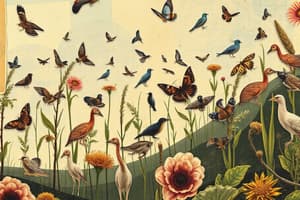Podcast
Questions and Answers
What are the three fundamental features of a community?
What are the three fundamental features of a community?
- Species diversity, trophic structure, species richness
- Species diversity, feeding relationships, interspecific interactions (correct)
- Species diversity, relative abundance, trophic levels
- Species richness, trophic levels, interspecific interactions
What are the two components of species diversity in a community?
What are the two components of species diversity in a community?
- Species abundance and trophic levels
- Species diversity and interspecific interactions
- Species richness and trophic structure
- Species richness and relative abundance (correct)
What is the role of producers in a trophic structure?
What is the role of producers in a trophic structure?
- They have no specific role in the trophic structure
- They are the decomposers recycling biomass
- They are the autotrophs of a community and all organisms rely on them (correct)
- They are the top carnivores in a food chain
What is a food web in a trophic structure?
What is a food web in a trophic structure?
What do decomposers do in a community?
What do decomposers do in a community?
What is the proportion each species represents of all individuals in the community called?
What is the proportion each species represents of all individuals in the community called?
What are the different levels of heterotrophic organisms called in a trophic structure?
What are the different levels of heterotrophic organisms called in a trophic structure?
What is the variety of organisms that make up a community called?
What is the variety of organisms that make up a community called?
What is the term for the specific set of biotic and abiotic resources used by an organism?
What is the term for the specific set of biotic and abiotic resources used by an organism?
Which interaction occurs when two species compete for a limited resource?
Which interaction occurs when two species compete for a limited resource?
What is the term for interactions where both species benefit?
What is the term for interactions where both species benefit?
Which organism eats parts of plants or algae?
Which organism eats parts of plants or algae?
What type of interaction occurs when one species benefits and the other is neither helped nor harmed?
What type of interaction occurs when one species benefits and the other is neither helped nor harmed?
What is the term for an organism that derives nourishment from another organism, its host, which is harmed in the process?
What is the term for an organism that derives nourishment from another organism, its host, which is harmed in the process?
What may occur if two species’ niches overlap?
What may occur if two species’ niches overlap?
Which interaction between a consumer and another species involves the consumer feeding upon the other species?
Which interaction between a consumer and another species involves the consumer feeding upon the other species?
What are interactions between populations in a community called?
What are interactions between populations in a community called?
What is the term for the interactions between populations in a community categorized by their effect on the survival and reproduction of each species?
What is the term for the interactions between populations in a community categorized by their effect on the survival and reproduction of each species?
Flashcards are hidden until you start studying
Study Notes
Fundamental Features of a Community
- Community structure includes species diversity, species interactions, and the physical environment.
- A community has both biotic (living) and abiotic (non-living) components that interact.
Components of Species Diversity
- Species richness refers to the number of different species in a community.
- Species evenness indicates how evenly individuals are distributed among those species.
Role of Producers in Trophic Structure
- Producers, primarily plants and phytoplankton, convert solar energy into chemical energy through photosynthesis.
- They form the base of the food chain, supporting all other trophic levels.
Food Web in Trophic Structure
- A food web consists of interconnected food chains, illustrating the complex feeding relationships among organisms in a community.
- It represents multiple pathways of energy flow and nutrient cycling.
Role of Decomposers
- Decomposers break down dead organic matter, returning vital nutrients to the soil.
- They play a crucial role in recycling materials within the ecosystem.
Proportion of Species in a Community
- The term for the proportion each species represents of all individuals in the community is relative abundance.
Levels of Heterotrophic Organisms
- Heterotrophic organisms are categorized into primary consumers, secondary consumers, and tertiary consumers based on their feeding levels in the trophic structure.
- Primary consumers eat producers, secondary consumers eat primary consumers, and tertiary consumers eat secondary consumers.
Variety of Organisms in a Community
- The variety of organisms within a community is referred to as biodiversity.
Specific Set of Resources for an Organism
- The specific set of biotic and abiotic resources an organism uses is known as its ecological niche.
Competition Between Species
- Competition occurs when two species vie for limited resources such as food, space, or mates.
Beneficial Interactions
- Mutualism describes interactions where both species involved benefit from the relationship.
Organisms That Eat Parts of Plants or Algae
- Herbivores are organisms that consume parts of plants or algae.
Neutral Interactions
- Commensalism is the interaction where one species benefits while the other is neither helped nor harmed.
Parasitism
- Parasitism involves an organism deriving nourishment from a host, which is harmed in the process.
Consequences of Overlapping Niches
- If two species’ niches overlap significantly, it may lead to competition, potential exclusion, or evolutionary adaptations.
Consumer-Target Species Interaction
- Predation is the interaction where a consumer feeds on another species, potentially leading to its death.
Population Interactions in a Community
- Interactions between populations in a community are known as community ecology.
Effects of Interactions Between Populations
- The term for interactions between populations categorized by their effects on survival and reproduction is species interactions or ecological interactions.
Studying That Suits You
Use AI to generate personalized quizzes and flashcards to suit your learning preferences.




